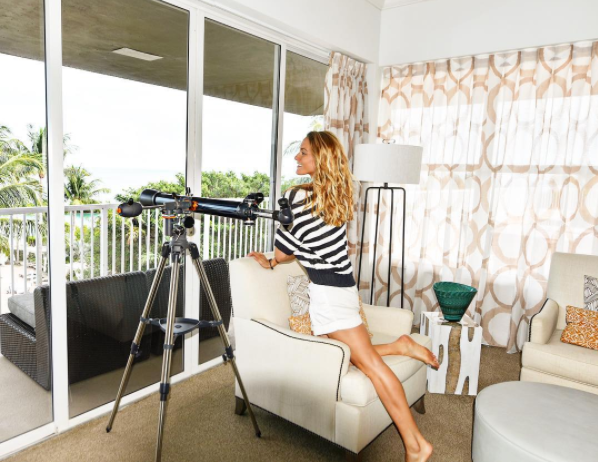Meet Cassandra De Pecol - The First Woman To Explore All 196 Countries
Every new year brings about a list of new goals and global adventures that we try to manifest into a reality. For some, going to the gym and cutting gluten ranks number one, and for others, exploring new countries takes the top spot.
When we heard about Cassandra De Pecol, the first and fastest woman to circle the globe, we just knew that we had to speak with her. Is it her love of adventure that motivates her? Is it a vast bucket list that lights her proverbial fire? Either way, she could lend some serious inspiration and courage for every single soul that’s looking to live a little this year.
We dig deep to discover ten interesting things about Cassie De Pecol, including a quick-fire list of her top spots, eats and sights.
1. What motivates you to travel?
“Since high school, I had this feeling that I’d do something major in life, change the world, enhance the world, something like that. I always had this yearning to accomplish something way bigger than myself and to make a longstanding, positive impact in the world. It wasn’t until the age of 25 when reality hit me that this vision was never going to come to fruition unless I made some major moves as soon as possible. I wasn’t happy with where my life was headed, working odd jobs and not following my passion so, that, muddled with the anxiety of never knowing how much time we’ll have left, made me take that leap of faith. I knew that it was now or never and at that point, I decided that no one was going to steer me away from this worldly vision and extravagant personal goal.”
2. Can you share your favourite trip so far?
“One of my first moments that was a real eye-opener, was when I was in Vanuatu. They had experienced a devastating cyclone the year prior and it was my goal to immerse myself in the every day life of people and their culture. I walked throughout the villages with my camera slung over my shoulder and was invited into the home of one specific man and his family. He didn’t expect anything in return other than to just show me his home and how they made Kava, a popular drink made naturally throughout the Oceanic region. I felt safe and trusting in these people and from this moment on, early in my Expedition, that I realized the power of good in humanity.”
3. We love that you have sponsors helping you out with this major accomplishment, how did you reach out to them – and how have they helped shape your journey?
“It took a year and a half to obtain all the sponsors and funding for the Expedition via utilizing LinkedIn and Google, creating a sponsorship deck, proposal and pitch and sending it out. The sponsors are anywhere from airline and hotels, to C-level sponsors. Filming an educational documentary, investors have also contributed to the production of this film, thereby financially contributing to the Expedition. The majority of my sponsors have been with me since day one, who believed in me when I didn’t have much to my name at the time. They’ve helped me realize the value in working with businesses and what sort of companies I want to continue to work with who also support my specific message.”
4. How many days do you spend in each location, and what sorts of activities do you find yourself doing?
“For me, this expedition is a matter of maximizing every single moment that I have within a given day, to absorb as much as I can with the little time that I have on this earth. It all comes down to two words: time management. There are several elements to this Expedition. Spreading peace through tourism and economics is one of them, promoting sustainability is another, and advocating women’s rights and achievement is another. Then there’s the YouTube vlogs, which showcase the beauty of many of these nations that I visit. The educational documentary that I’m filming to be used in part with a tool-kit and book written with the students I’ve spoken to all over the world. I also promote my sponsors as well.
People often say that there’s no way I can preach sustainability when I fly so much, and they’re right. I’m not saying that I’m a sustainable traveller, but I am working towards being one with each tree that I plant with the students on this Expedition (45 so far in 12 countries), collecting water samples to test for the presence of microplastics to send to adventurers and scientists for conservation, staying in and promoting sustainable/regenerative hotels, and most importantly, educating university students who are studying tourism, on the importance of responsible travel and incorporating or keeping in mind the elements of sustainable/regenerative hospitality and tourism. Many students I’ve spoken to have no idea what sustainability even means, so it’s my job to educate them on this and encourage them to support responsible tourism best practices when pursuing internships and throughout their careers.
Peace through Tourism can really be best understood by educating the students on how we can quantify peace through a series of criteria set forth by the Institute for Economics and Peace. Once we understand this criteria, we can then work towards creating a more peaceful and united world. In regards to the tourism aspect of it, this is where I engage the ministry and Mayors, where they also attend these keynote sessions and I present to them the ‘IIPT Credo of the Peaceful Traveler’ set forth by the International Institute of Peace Through Tourism of which I’m endorsed. Together, we discuss how tourism can be a mediator between peace and conflict, and a way to further friendship among nations as well as providing humanitarian assistance. For instance, a sustainable hotel partnering with Pack for a Purpose, where guests can bring educational supplies to then distribute to local schools in need in the area where they’re vacationing.
Since starting my Expedition, I’ve spoken to over 12,500 students and dignitaries across 33 countries, and continue to be approached by the youth (both young women and young men) in regards to how they can pursue their dreams after listening to my talk. As a young woman myself, I like to think that I can set the standard for young women worldwide to pursue a quest or dream that is out of the norm or that everyone tells them they shouldn’t do. It’s my job to leave a legacy behind that positively influences future generations of innovators, entrepreneurs and trendsetters, especially when it comes to women.”
5. Where have you had the most memorable meal, and what was it?
“Mexico! Wow… or Bahrain. Either way, Bahrain proved to be a unique culinary experience where I tasted true Middle Eastern food, and lots of it! I met up with Skal there. Same with Mexico, I could eat Mexican food the rest of my life and be as happy as a clam, and Skal really laid out a smorgasbord of local dishes that were so delicious.”
6. Can you give us any of your air tips? (Is there something you always pack, how do you deal with bumpy flights or major delays?)
“Wait until you’re the last to board to have free pickings of your seat, just don’t tell the flight attendants, act like that entire row of 3 seats is where your seat is, and voila! Pack light, I don’t go anywhere without my iPhone and headphones… necessary on long flights. As far as bumpy flights, I always bring a little thing of whiskey, since I get a lot of anxiety flying, and that seems to take the edge off (not the best solution, but I know I’m not the only one!) and as for delays, as long as there’s internet, I can get work done. If not, I catch up on my daily personal blog.”
7. How do you get around language barriers and social customs in different parts of the world?
“It’s not that big of an issue, thanks to Google Translate. If I’m really in a pickle, I’ll go to a nicer hotel where you know there will be a receptionist who can help translate for you. In a city, this is fairly easy to find, but in the country, you’re on your own. English is the universal language and I’ve never had any problems finding someone to help translate. Africa was difficult though since French is spoken in many countries and I don’t know a lick of it. It can be difficult to find people who speak English in some of the South American countries, but I can get around with Spanish, so it’s not that bad.”
8. Once you’re done circling the world, what do you plan on doing?
“Finish the educational documentary and book series, write my own book, develop the universal student internship program, line up motivational speaking events, work on non-profit development and a travel line, etc. etc. The list is endless, but I can tell you that I won’t be sitting in one place for awhile.”
9. Where would you love to plant roots one day?
“Go back out to Los Angeles but I’d love to try out Vancouver and Colorado!”
10. Is there a country that you would think has been misjudged, and you would encourage people to visit?
“Afghanistan.”
Quick-Fire Questions:
Favourite Country? Turkey
Favourite City? Copenhagen
Favourite View? Mountains
Favourite Language? Arabic
Favourite Food? Mexican




